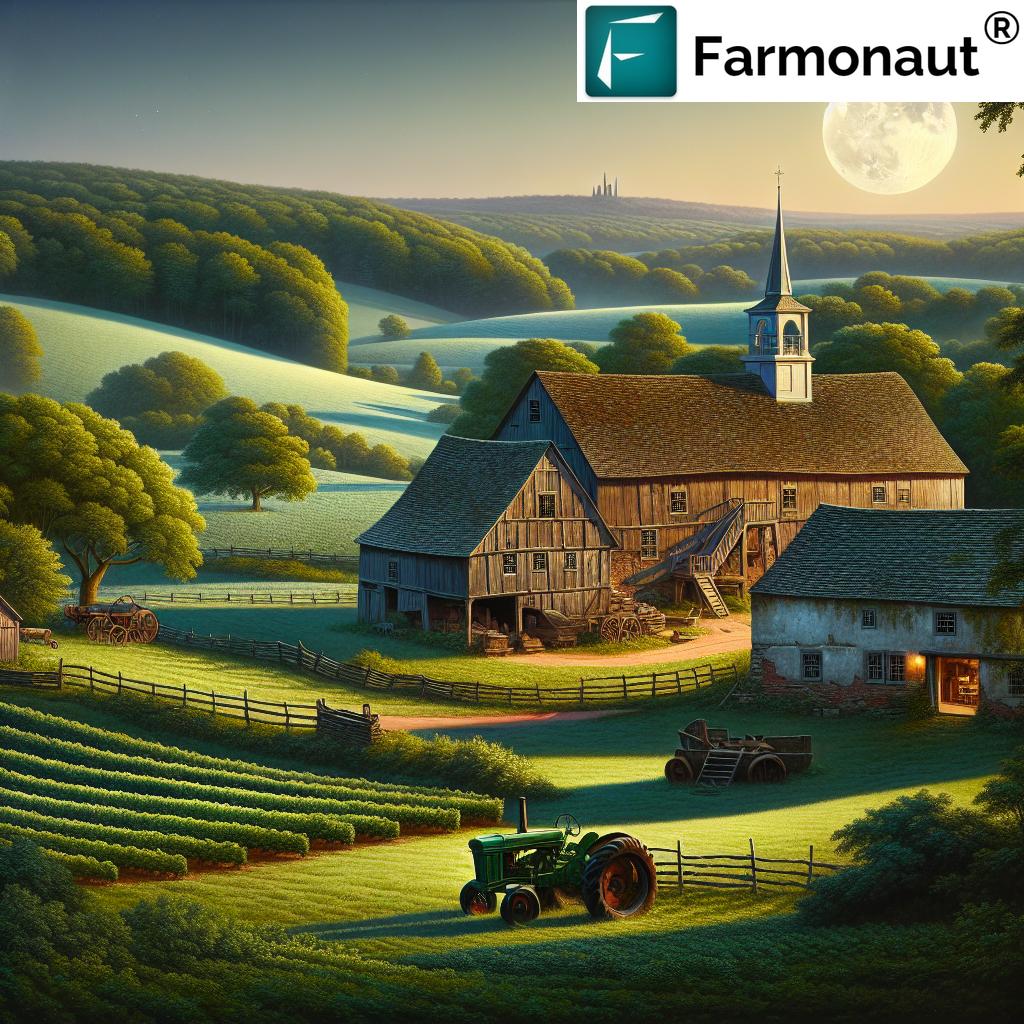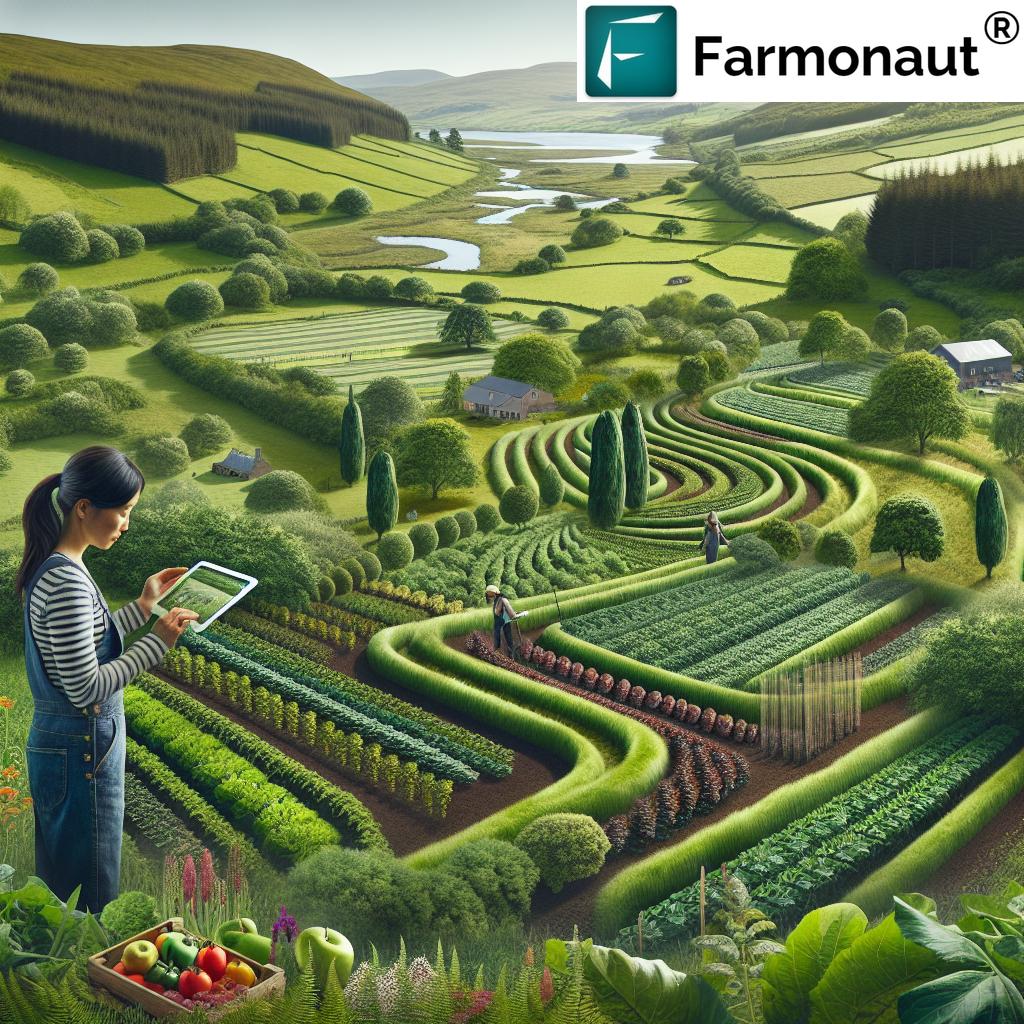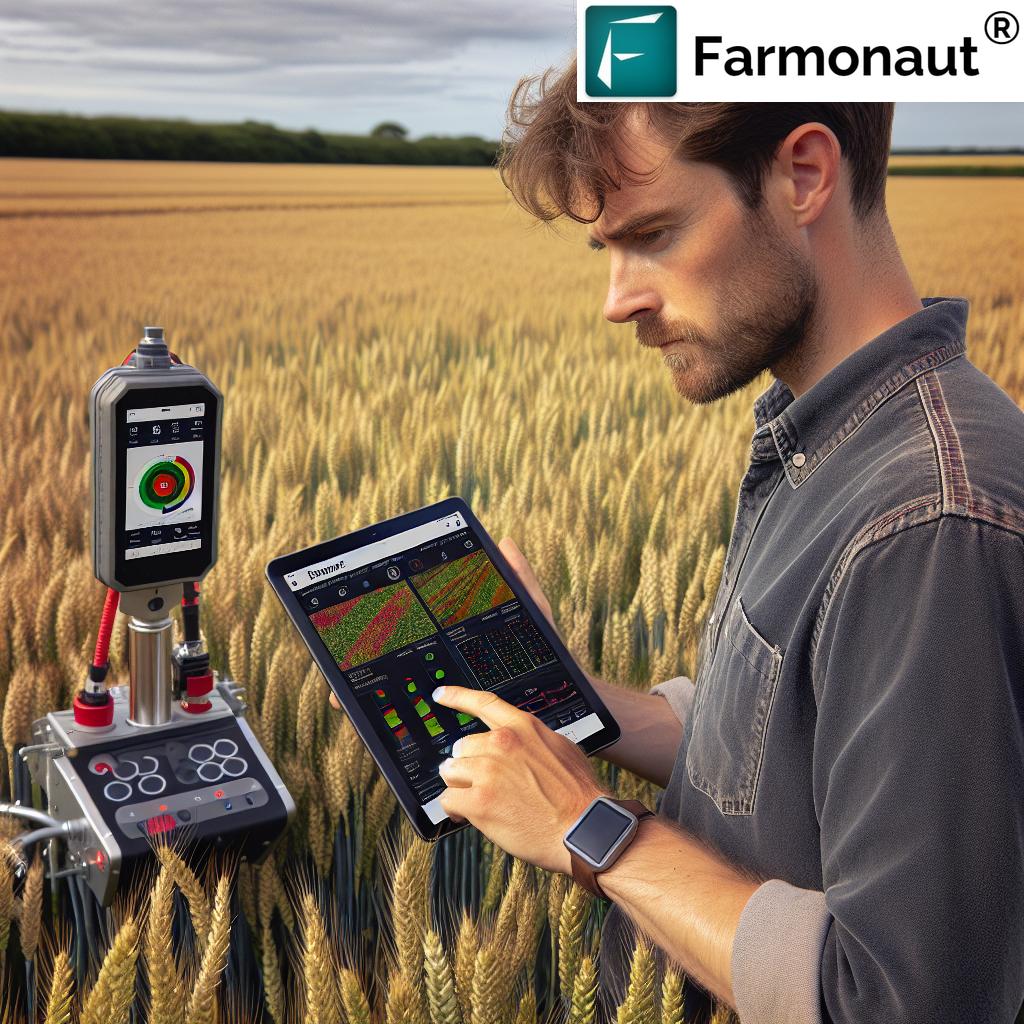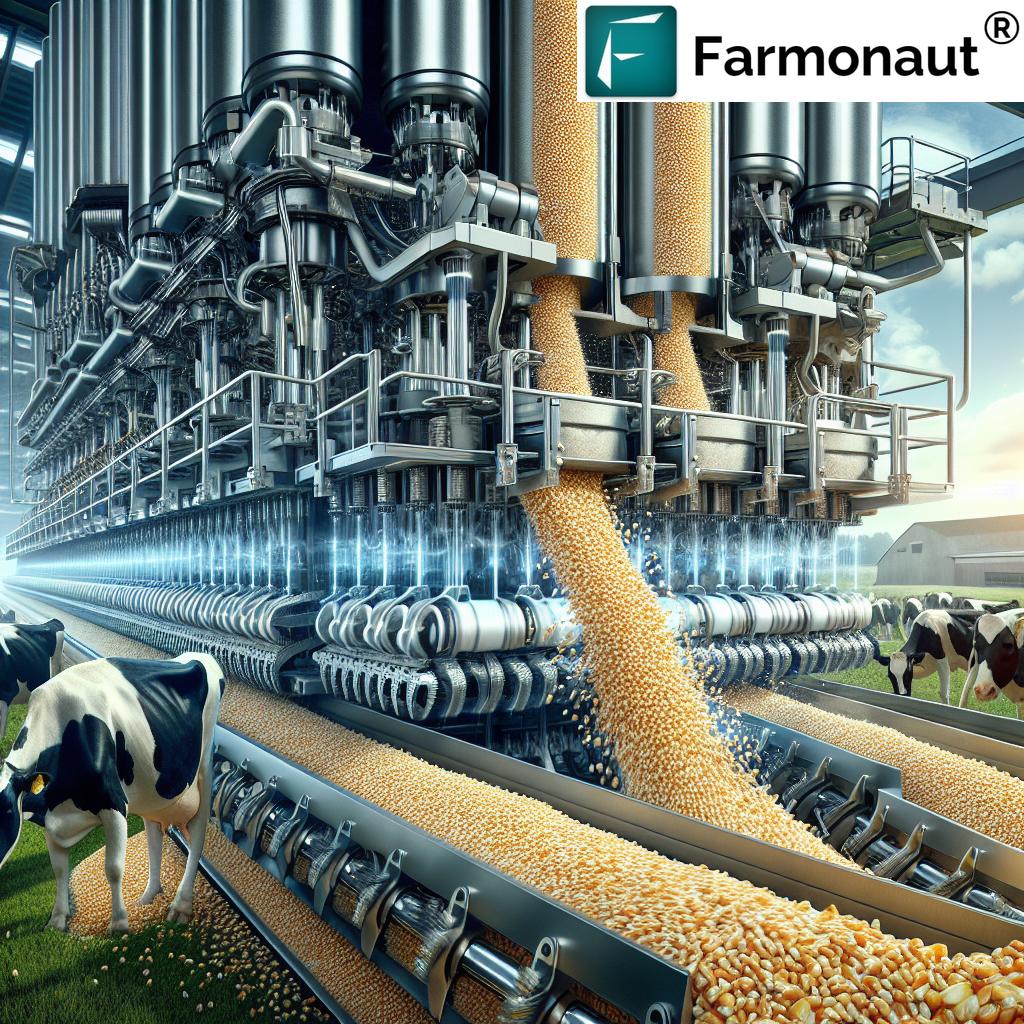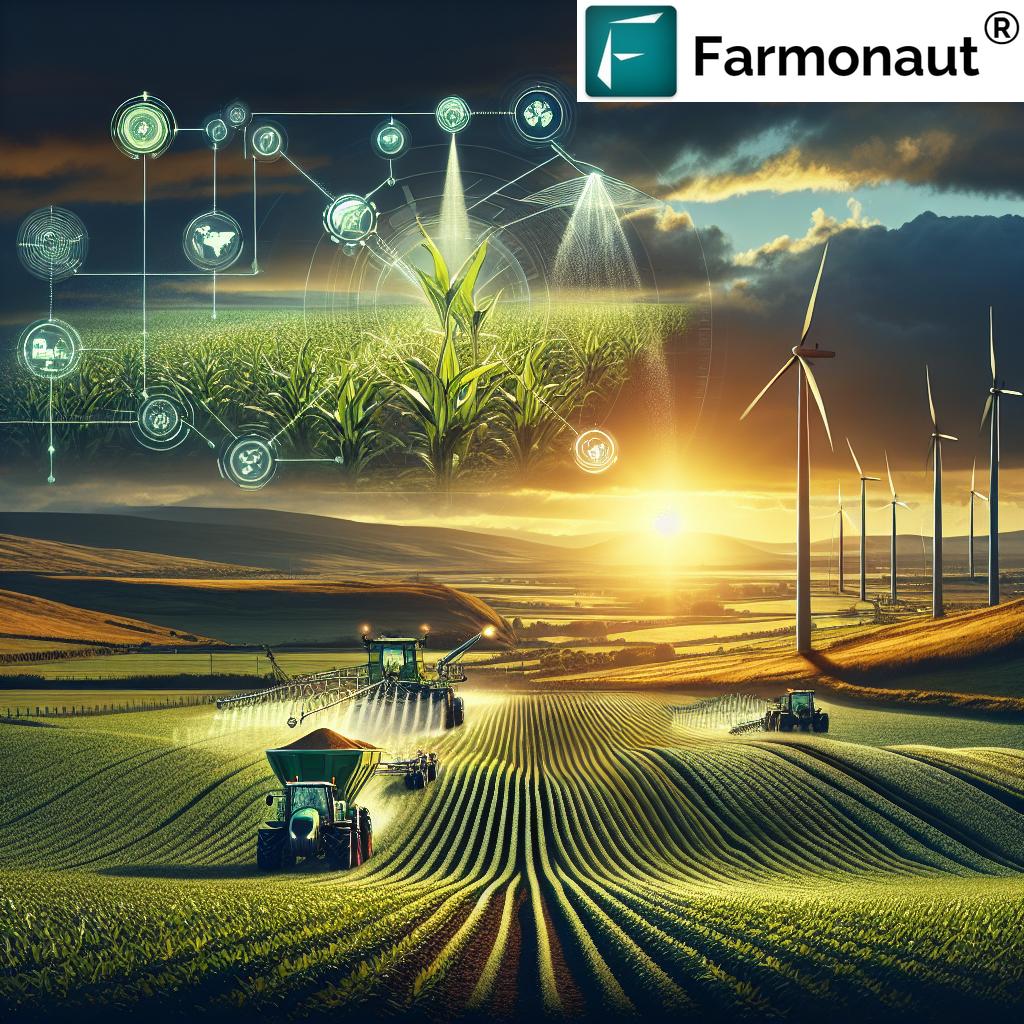Farmonaut’s Guide: Climate-Smart Agriculture and Sustainable Forestry Management in Ireland
“Ireland’s 2024-2025 Forest and Woodland Awards feature at least 3 categories: farm forestry, silviculture, and native woodland preservation.”
Welcome to Farmonaut’s comprehensive guide on climate-smart agriculture and sustainable forestry management in Ireland. As we delve into the exciting world of the upcoming 2024-2025 Irish Forest and Woodland Awards, we’ll explore how modern agricultural innovation and traditional forestry practices are shaping a greener future for Ireland’s rural landscapes.

The Importance of Sustainable Forestry Management and Climate-Smart Agriculture
In the face of global climate change and environmental challenges, sustainable forestry management and climate-smart agriculture have become critical practices for ensuring the long-term health of our planet. These approaches not only help mitigate greenhouse gas emissions but also promote biodiversity, soil health, and overall ecological balance.
At Farmonaut, we’re committed to supporting these sustainable practices through our advanced satellite-based farm management solutions. Our technology aids in precision agriculture and environmental monitoring, aligning perfectly with the goals of the Irish Forest and Woodland Awards.
The 2024-2025 Irish Forest and Woodland Awards: A Celebration of Sustainability
The upcoming 2024-2025 Irish Forest and Woodland Awards is a prestigious event that celebrates farmers and woodland owners who excel in environmental conservation, biodiversity enhancement, and innovative agricultural practices. This event spotlights various categories, including:
- Farm forestry integration
- Silvicultural excellence
- Native woodland preservation
Participants have the opportunity to showcase their commitment to sustainable practices, from timber production to community-managed woodlands. With a strong focus on climate action and carbon management, these awards highlight the crucial role of forests in mitigating greenhouse gas emissions and promoting ecological balance.
Climate-Smart Agriculture: A Key to Sustainable Farming
Climate-smart agriculture is an approach that helps to guide actions needed to transform and reorient agricultural systems to effectively support development and ensure food security in a changing climate. It aims to tackle three main objectives:
- Sustainably increasing agricultural productivity and incomes
- Adapting and building resilience to climate change
- Reducing and/or removing greenhouse gas emissions, where possible
In Ireland, climate-smart agriculture practices are becoming increasingly important as farmers face the challenges of a changing climate. These practices include:
- Precision farming techniques
- Crop diversification
- Improved water management
- Soil conservation methods
Farmonaut’s advanced satellite-based technology plays a crucial role in supporting these practices. Our platform provides real-time crop health monitoring, AI-based advisory systems, and resource management tools that enable farmers to make data-driven decisions for optimal farm management.
Sustainable Forestry Management: Preserving Ireland’s Woodlands
Sustainable forestry management is the practice of managing forests to meet the current needs of society without compromising the ability of future generations to meet their own needs. In Ireland, this approach is crucial for maintaining the country’s rich woodland heritage while also supporting economic development.
Key aspects of sustainable forestry management include:
- Biodiversity conservation
- Soil and water protection
- Carbon sequestration
- Sustainable timber production
- Recreational and cultural value preservation
The Irish Forest and Woodland Awards recognize excellence in these areas, encouraging woodland owners to adopt best practices in forestry management.
Farm Forestry Integration: Bridging Agriculture and Forestry
Farm forestry integration is a practice that combines traditional farming with forestry on the same land. This approach offers numerous benefits, including:
- Diversification of income sources for farmers
- Enhanced biodiversity on farmland
- Improved soil health and reduced erosion
- Carbon sequestration
- Shelter for livestock
The Irish Forest and Woodland Awards recognize farmers who have successfully integrated forestry into their farming operations, showcasing how this practice can contribute to both economic and environmental sustainability.
Silvicultural Excellence: The Art and Science of Forest Management
Silviculture is the art and science of controlling the establishment, growth, composition, health, and quality of forests to meet diverse needs and values. In the context of the Irish Forest and Woodland Awards, silvicultural excellence refers to the implementation of best practices in forest management for timber production and ecosystem health.
Key silvicultural practices include:
- Proper site selection and preparation
- Selection of appropriate tree species
- Thinning and pruning techniques
- Pest and disease management
- Sustainable harvesting methods
Farmonaut’s satellite-based technology can assist in silvicultural practices by providing detailed imagery and data on forest health, growth patterns, and potential areas of concern.
Explore Farmonaut’s API for advanced satellite data integration
Native Woodland Preservation: Protecting Ireland’s Natural Heritage
Native woodlands are a crucial part of Ireland’s natural heritage, providing unique habitats for a wide range of flora and fauna. The preservation of these woodlands is essential for maintaining biodiversity and ecological balance.
The Irish Forest and Woodland Awards recognize efforts in native woodland preservation, which may include:
- Restoration of degraded native woodlands
- Creation of new native woodland areas
- Implementation of sustainable management practices
- Protection of rare and endangered species
- Community engagement in woodland conservation
“Forests play a dual role in Ireland’s climate action, mitigating greenhouse gases and promoting ecological balance.”
The Role of Technology in Sustainable Forestry and Agriculture
Technology plays a crucial role in advancing sustainable forestry management and climate-smart agriculture. At Farmonaut, we leverage cutting-edge technologies to support these practices:
- Satellite-Based Crop Health Monitoring: Our platform uses multispectral satellite images to monitor crop health, providing farmers with insights into vegetation health (NDVI), soil moisture levels, and other critical metrics.
- AI-Driven Advisory Systems: Our Jeevn AI advisory system delivers real-time insights, weather forecasts, and expert crop management strategies to farmers.
- Blockchain-Based Traceability: We offer blockchain solutions for product traceability, ensuring transparency and security in agricultural supply chains.
- Carbon Footprint Tracking: Our technology helps agribusinesses monitor and reduce their environmental impact through real-time carbon footprint tracking.
These technologies empower farmers and forestry managers to make data-driven decisions, optimize resource use, and implement sustainable practices more effectively.
Check out our API Developer Docs for more information
Community-Managed Woodlands: Engaging Local Populations
Community-managed woodlands are an important aspect of sustainable forestry management in Ireland. These woodlands are managed by local communities, often with support from government agencies or NGOs. The benefits of community-managed woodlands include:
- Increased local ownership and engagement in woodland conservation
- Opportunities for education and skill development
- Enhanced recreational facilities for local communities
- Sustainable production of timber and non-timber forest products
- Preservation of cultural heritage associated with woodlands
The Irish Forest and Woodland Awards recognize outstanding examples of community-managed woodlands, highlighting the importance of local engagement in sustainable forestry practices.
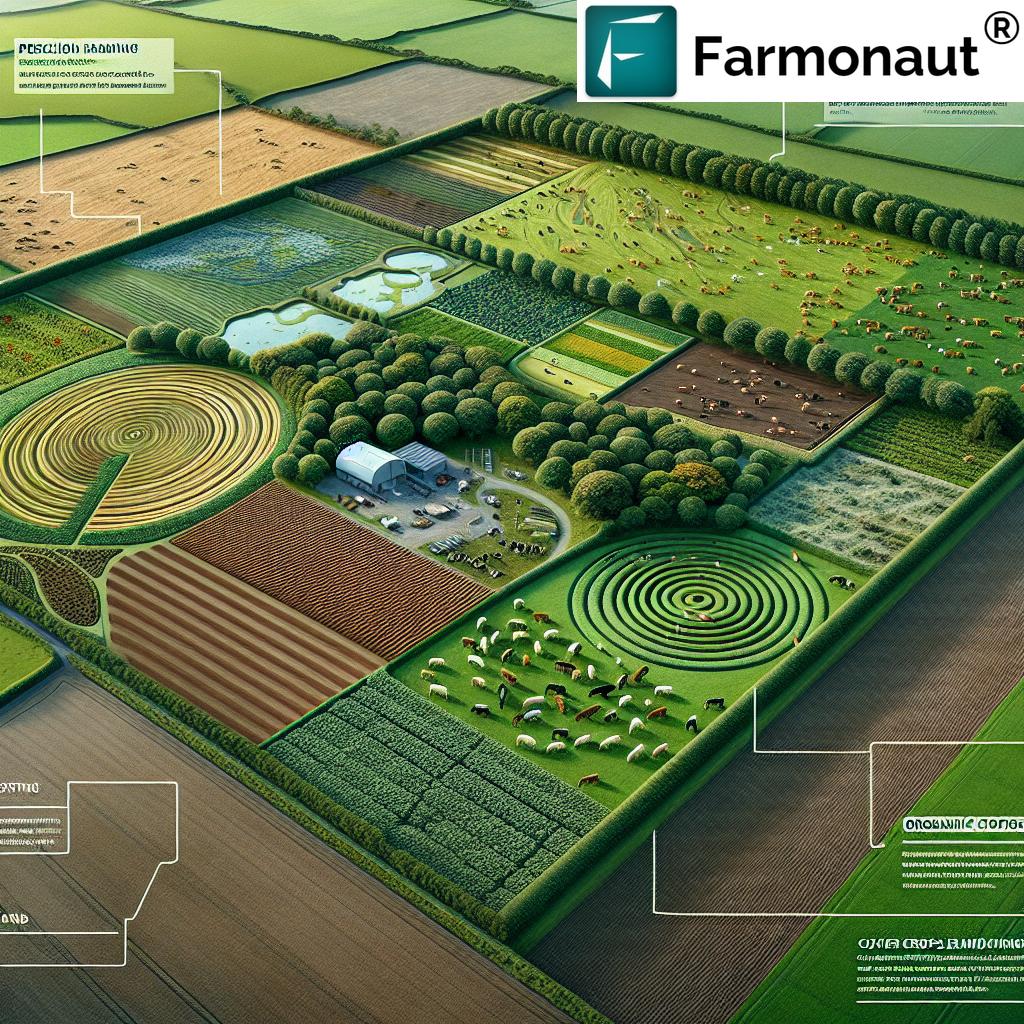
Climate Action and Carbon Management in Irish Forestry
Forests play a crucial role in climate action and carbon management. In Ireland, sustainable forestry practices contribute significantly to the country’s efforts to reduce greenhouse gas emissions and mitigate climate change. Some key aspects of climate action in forestry include:
- Carbon sequestration through afforestation and reforestation
- Sustainable forest management to maintain carbon stocks
- Use of wood products as a substitute for more carbon-intensive materials
- Bioenergy production from forest residues
- Adaptation strategies to increase forest resilience to climate change
The Irish Forest and Woodland Awards recognize initiatives that demonstrate excellence in climate action and carbon management within the forestry sector.
Biodiversity Enhancement in Agriculture and Forestry
Enhancing biodiversity is a critical aspect of both sustainable agriculture and forestry management. In Ireland, efforts to promote biodiversity include:
- Creation and maintenance of wildlife corridors
- Preservation of old-growth forests and ancient trees
- Implementation of agroforestry systems
- Restoration of wetlands and other important habitats
- Promotion of organic farming practices
Farmonaut’s technology can assist in biodiversity enhancement efforts by providing detailed mapping and monitoring of habitats, allowing for more targeted conservation efforts.
The Future of Sustainable Forestry and Agriculture in Ireland
As we look to the future, the integration of sustainable forestry management and climate-smart agriculture will be crucial for Ireland’s rural landscapes. Some key trends and developments to watch include:
- Increased use of precision agriculture technologies
- Greater focus on agroforestry and integrated land-use systems
- Development of climate-resilient crop varieties and tree species
- Expansion of carbon markets and ecosystem service payments
- Enhanced collaboration between farmers, foresters, and conservation organizations
Farmonaut is committed to supporting these developments through our innovative technology solutions, helping to create a more sustainable and resilient agricultural and forestry sector in Ireland.
Climate-Smart Agriculture and Sustainable Forestry Practices in Ireland
| Practice | Environmental Benefits | Economic Benefits | Implementation Challenges |
|---|---|---|---|
| Agroforestry | Enhanced biodiversity, improved soil health, carbon sequestration | Diversified income streams, increased land productivity | Initial investment costs, long-term planning required |
| Native Woodland Preservation | Conservation of indigenous species, habitat protection | Eco-tourism opportunities, sustainable timber production | Balancing conservation with economic needs, managing invasive species |
| Precision Agriculture | Reduced chemical use, improved resource efficiency | Increased crop yields, lower input costs | High initial technology costs, need for technical expertise |
| Silvicultural Techniques | Improved forest health, enhanced carbon storage | Higher quality timber production, sustainable forest management | Labor-intensive, requires specialized knowledge |
How to Apply for the Irish Forest and Woodland Awards
If you’re a farmer, woodland owner, or community group engaged in sustainable forestry or agriculture practices, we encourage you to consider applying for the 2024-2025 Irish Forest and Woodland Awards. Here’s a brief overview of the application process:
- Review the Categories: Familiarize yourself with the different award categories and determine which best fits your project or practices.
- Gather Documentation: Collect evidence of your sustainable practices, including photographs, management plans, and any relevant data or statistics.
- Prepare Your Application: Draft a comprehensive description of your project, highlighting how it aligns with the awards’ sustainability and conservation goals.
- Submit Your Entry: Follow the official submission guidelines and ensure your application is submitted before the deadline.
- Site Visits: Be prepared for potential site visits by the judging panel as part of the evaluation process.
Remember, participating in these awards not only provides recognition for your efforts but also contributes to the broader goal of promoting sustainable practices across Ireland.
Farmonaut: Your Partner in Sustainable Agriculture
At Farmonaut, we’re committed to supporting farmers and land managers in their journey towards more sustainable and efficient practices. Our advanced satellite-based farm management solutions offer a range of tools to help you optimize your operations:
- Real-time Crop Health Monitoring: Get up-to-date information on your crop’s health status, allowing for timely interventions.
- AI-powered Advisory System: Receive personalized recommendations based on your specific farm conditions and crop types.
- Resource Management Tools: Optimize your use of water, fertilizers, and other inputs for maximum efficiency and minimal environmental impact.
- Carbon Footprint Tracking: Monitor and reduce your farm’s carbon emissions, contributing to climate change mitigation efforts.
By leveraging these tools, you can enhance your farm’s productivity while also implementing sustainable practices that align with the goals of the Irish Forest and Woodland Awards.
Frequently Asked Questions
Q: What are the main categories in the 2024-2025 Irish Forest and Woodland Awards?
A: The main categories include farm forestry integration, silvicultural excellence, and native woodland preservation. There may be additional categories focusing on community-managed woodlands and climate action initiatives.
Q: How can Farmonaut’s technology support sustainable forestry management?
A: Farmonaut’s satellite-based technology can provide detailed imagery and data on forest health, growth patterns, and potential areas of concern. This information can be used to inform management decisions and optimize silvicultural practices.
Q: What is climate-smart agriculture, and why is it important?
A: Climate-smart agriculture is an approach that aims to increase agricultural productivity sustainably, adapt to climate change, and reduce greenhouse gas emissions where possible. It’s important because it helps ensure food security while minimizing environmental impact in the face of climate change.
Q: How can I get started with implementing sustainable practices on my farm or woodland?
A: Start by assessing your current practices and identifying areas for improvement. Consider integrating agroforestry, implementing precision farming techniques, or focusing on biodiversity enhancement. Farmonaut’s tools can help you monitor and optimize these efforts.
Q: Are there any grants or support available for implementing sustainable forestry or agricultural practices in Ireland?
A: Yes, there are various grants and support schemes available through the Irish government and EU programs. These may include afforestation grants, woodland improvement schemes, and agri-environment measures. Check with the Department of Agriculture, Food and the Marine for the most up-to-date information.
Conclusion
The 2024-2025 Irish Forest and Woodland Awards represent a significant opportunity to showcase and celebrate the best practices in sustainable forestry management and climate-smart agriculture across Ireland. By recognizing excellence in these areas, the awards play a crucial role in promoting environmental conservation, biodiversity enhancement, and innovative agricultural practices.
As we’ve explored in this guide, the integration of modern technology with traditional land management practices is key to creating a more sustainable and resilient future for Ireland’s rural landscapes. Farmonaut is proud to be at the forefront of this integration, offering cutting-edge solutions that empower farmers and land managers to make data-driven decisions and implement sustainable practices more effectively.
Whether you’re a farmer looking to optimize your operations, a woodland owner striving for sustainable management, or simply someone interested in the future of agriculture and forestry in Ireland, we hope this guide has provided valuable insights and inspiration. Let’s continue to work together towards a greener, more sustainable future for Ireland’s forests and farms.






